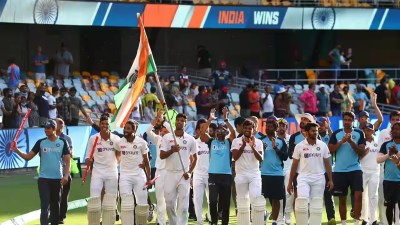Search for a scapegoat
The current turbulence in the Shiv Sena reveals how badly it is shaken by its drubbing in the Lok Sabha election. It is evidently at a loss ...

The current turbulence in the Shiv Sena reveals how badly it is shaken by its drubbing in the Lok Sabha election. It is evidently at a loss for answers for its fall in popularity all over Maharashtra. From 15 seats in 1996 the Sena is reduced to six. Its ally in the ruling coalition, the BJP, fared even worse, down from 18 to four. By any reckoning this is a precipitous decline. Sena leaders, thrashing around for remedies but unwilling to accept direct responsibility for the setback, have begun to fall out amongst themselves. Chief Minister Manohar Joshi who offered to resign when the results came in was persuaded to continue by Bal Thackeray but not out of real conviction about his merits, it now appears. Last week Joshi was the target of thinly veiled allegations of corruption made by Thackeray in his paper Saamna. This coincided with and had the effect of corroborating charges of misuse of office made by a Congress leader in the Assembly. Exactly what led Thackeray to open this new front is unclear.That he suffers from a sense of insecurity is clear.
Underlying these messy tactics are some hard facts which the Sena chief does not seem ready to confront. He feels cheated by the Lok Sabha results of the opportunity he has so long wanted of exercising power through remote control at the Centre. It is undoubtedly unnerving to find the ground being sucked out from under him by the ebbing tide of the Sena8217;s popularity. Three years seem all too short a time at the top after the decades in the wilderness. As these thoughts press in on him, Thackeray is having trouble accepting that just as he assumed most of the credit for the Sena8217;s victories of 1995 and 1996 he must accept the larger part of the blame for the defeats of 1998. His dilemma is the dilemma of all absolutist leaders. To confess to his own errors as party chief or to blame the government which he claimed he controlled tightly is to expose feet of clay and invite a loss of credibility and authority within the Sena.
There are several worryingaspects to the inability of Sena leaders to get to grips with reality. Thackeray as well as Joshi persist in the dangerous belief that the minorities and Dalits are chiefly responsible for the Sena-BJP8217;s defeats whereas the verdict shows disenchantment on a much wider scale. In another area, despite tacit admission of the difficulties, the Sena refuses to see the utter impracticality of its programmes of providing free houses to 40 lakh slum-dwellers and free lunches to all comers. Another example is the attempt to improve government8217;s finances by setting impossibly high small savings targets and pressuring public servants to achieve them. At a time when they appear ill-equipped to deal with their problems, the Shiv Sena8217;s bosses will be required to meet their biggest challenge yet. Joshi has promised to table the Srikrishna report into the 1992-93 riots this week. Maharashtra can only hope that whatever the implications for the Sena, the Chief Minister will have the strength to handle the situation wiselyand calmly.
- 01
- 02
- 03
- 04
- 05































